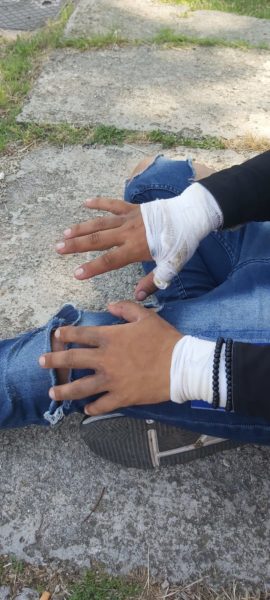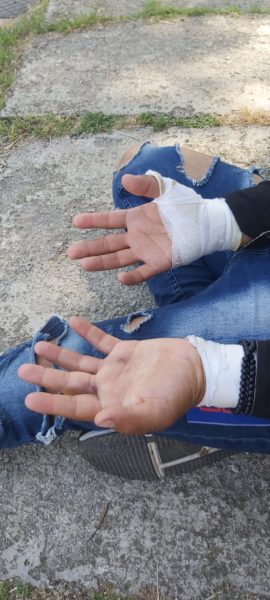We were eleven minors and when I told them, police said ‘I don’t care about it, write eighteen years old'
| 20.07.2021 | Near the highway E-65, Croatia | No Name Kitchen | 45.417348, 15.099274 | Croatia | Bosnia | yes | no | yes | yes | no | no | 2 - 17 | 31 | Afghanistan | detention, photos taken, personal information taken, papers signed, Minors forced to write fake ages | 10 | beating (with batons/hands/other), exposure to air condition and extreme temperature during car ride, theft of personal belongings | 10 Croatian special Police Team officers (green uniforms), 3 vans |
On the night of the 19th to the 20th July, a group of 31 people of Afghan origin were pushed back from Croatian into BiH at around 2 or 3 am. The respondent says that the Croatian authorities encountered group members at a location approximately 5 hours away from Slovenia.
“One day before Eid we were deported”.The respondent says that, when the group members encountered the Croatian authorities on a road close to E-65 Croatia, the group started running and the officers started running after them. “Every time they would say ‘This is Croatia, this is my country, why are you coming here? What do you want? It is not your country. Don’t run’”. The respondent claimed that the uniform of the authorities was “simple green”, which points out to the presence of the Special Police Team (SJP). He adds that there were 10 police officers when the group members were caught in E-65 but that the authorities told the group members that there were 50 police officers patrolling the area to discourage them from running. “They told me first, we are 50 people group in that area, you cannot go anywhere”. Furthermore, the respondent remembers that the Croatian authorities were carrying flashlights and night vision devices, which helped them catch all the group members. The respondent asserts that when the authorities encountered the group members, they used batons to beat them. “They would push us, they would use these black police things (batons) to beat us in our hands, in our stomach, in our legs, everywhere (…) My boss they would push him on the hair and it is a bit cut, other friend in his leg, other one in his ear, the shoulder”. Furthermore, the respondent explains that Croatian authorities struck him on his back and that, for that reason, he is not able to sleep normally. “They gave a powerful kick in my back”. The respondent also states that the authorities took some valuables from the group members: “First, they told us, ‘who has phone, who has power bank, who has knife, who has money… give it to us’… And when we didn`t give it the first time the phone, the power bank, knife and money, they would find them in our pockets and they would beat us”. The respondent declares that “Police took everything: 4 phones, 5 power banks, 2 or 3 knives…” as well as some documents and money. “They asked about money…5 people had 15, 10 or 20 euros and they would give it to them”. When asked about what the authorities did with their things, the respondent said that “they would put it into a bag and after we don’t know if they would burn it, or they would give it back”. The respondent recalls that, as the vans could not fit all the group members, the Croatian police pushed the people into the van with a kick. “There was so little space in the van”. The respondent claims that it was very hot inside the vehicle and that some group members asked the authorities for water and were not given any. The respondent recalls that the vans were big and had no windows in the back part. However, he did not know where the vehicle took him to, because “When they put us in (referring to the vehicle), we cannot see nothing, we cannot know it is day or night, we cannot know what time it is now, where are we coming, this is the mountain, this is the jungle, this is the road, this car is going up”. All in all, the respondent claims that the trip to the police station lasted for what he felt like 2 hours for him. A group member, who managed to keep his phone, reckoned that the police station was near the border of Slovenia. When they arrived at the police station, the respondent recalls that the group members were given some documents in Pashtu and were asked to write down their surname, last name, mother and father name, where they were from as well as their birthdate. “After that we would give some signatures for them, they would take a photo and other papers with my name, my father name, and my age”. “We were eleven minors and when I told them, police said ‘I don’t care about it, write eighteen years old’”. The respondent states that he insisted that 10 group members were minors but that they Croatian police told them to write that they were over 18. “When I tell them I’m 16 years old they tell me ‘no 16, you write here 18 years old, don’t write 16’, I asked why and they say “It’s rules” and push me there”. He continues stating the authorities’ words: “We don’t care about it, don’t write 2005, write here you are from 2003, 2002, 2001 like this for everyone.” “When commander catches us I tell them ‘please don’t deport me to Bosnia, Bosnia is so dangerous for me’”. The respondent explains that, in previous pushbacks he gave information about smuggling structures and that he is under threat and feels like his life is in danger. “They could give to some stranger, 1000 or 2000 euros and they will come and kill me, because every information which I have I told them to the police”. The respondent says he expressed how threatened he felt by the smugglers to both Croatian and Slovenian police in different times but that they wouldn’t “care about it”. “I told the Croatian police everything about them (the smugglers) but they didn’t care and deported me”. The respondent states that neither did the group members have a copy of the papers signed nor were could they take any pictures of it, because the police had previously taken their phones. In addition, the respondent recalls that police didn’t ask for their fingerprints at the police station. All in all, the respondent states that the group members were at the police station for what he felt like three hours. The respondent claims that, after the group members had signed the documents, they were told to go to a room and that, when all were finished, they were told to get into three vans. The respondent recalls that the police officers used three vans to fit all the group members and he further argues that all the group members were deported back to Bosnia in different times. “We were in 3 cars: some car has 8 people, some car has 12 people and some car have 14 people. With me, they only deported other 9 people, but after one hour more friends were coming and after two days some more were arriving in Bihac”. The respondent claims that the group members did not know where the authorities were taking them and that, when they asked, the police officers did not answer. The trip from the police station to the place the group members were pushed back to lasted for what the respondent felt like 5 hours. According to the respondent, the group members were deported to Bosanska Bojna: “They deported us directly, no asking of where we wanted to go, Sturlic, Kladusa…”. Moreover, the respondent states: “They deported us to Bojna, so far away from Bihac, Kladusa… When we were deported in Bojna we walked 15 km by feet, no car, with no money…”. Furthermore, the respondent reports violence during the pushback: “When they deported us the Croatian people (referring to the authorities) had something to fight (baton), they were standing still and told us ‘go, this is Bosnia’”. The respondent says that, when the police told the group members to hop off the vehicle, “at that time they would beat us (…), me and my friends went directly running, not caring about our feet and legs injuries”. However, the respondent claims that the other group members, who were injured in their feet and could not walk fast, were soon beaten up by the Croatian authorities with batons. “They cannot run, they would go slowly and the police came directly to beat them”. The respondent reports that the authorities beat them “in head, shoulders, feet, leg…” The respondent, together with some other group members, claimed that, after being pushed back, they walked 15 km from Bosanska Bojna to Velika Kladusa and then later from Velika Kladusa to Cazin and finally to Bihac. All in all, the respondent states that they walked 85 km approximately. The group members present several injuries, some derived from police brutality together, others derived from the journey in the jungle. This is the case of the respondent, who presents severe injuries in both his hands and ankles.“If we were in Afghanistan, never I would have this bandage, but in this place every month I will have”
 [caption id="attachment_18090" align="alignnone" width="270"]
[caption id="attachment_18090" align="alignnone" width="270"] The respondent presents injuries derived from the journey in the jungle during the night[/caption]
In addition, the respondent recalls that some group members in Bosanska Bojna encountered Bosnian police officers, who told them they could drive them to Bihac, but instead, drove them to Banja Luka. The respondent reports that one of the group members that was brought to Banja Luka lost three nails on one foot when walking from Banja Luka to Bihac.
The respondent presents injuries derived from the journey in the jungle during the night[/caption]
In addition, the respondent recalls that some group members in Bosanska Bojna encountered Bosnian police officers, who told them they could drive them to Bihac, but instead, drove them to Banja Luka. The respondent reports that one of the group members that was brought to Banja Luka lost three nails on one foot when walking from Banja Luka to Bihac.
“In Afghanistan problem, in Iran problem, in Turkey problem, in Greece problem, in Serbia problem, in Bosnia problem, in Croatia problem... Where is the humanity?”
